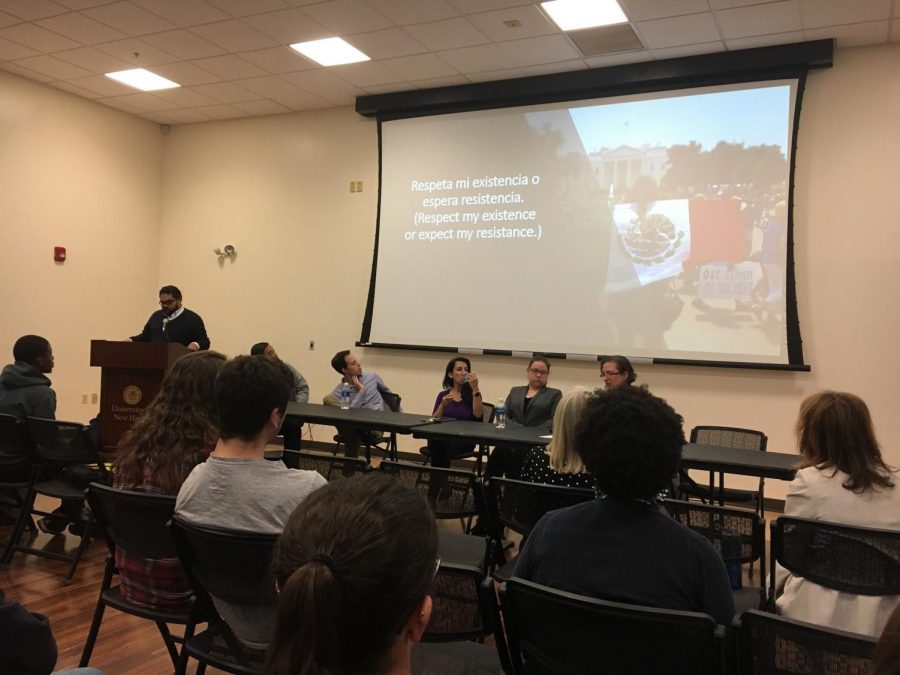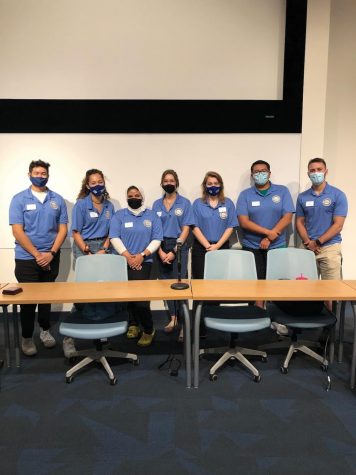A Panel on the DACA Program
Students and faculty filled the Alumni Lounge on Thursday afternoon (October 19) to participate in a discussion-based panel on the Deferred Action for Childhood Arrivals (DACA) program.
The panel, put on by the Current Issues Discussion Committee, was moderated by both Juan Hernandez, Director of the Myatt Center for Diversity and Inclusion, and Dr. Chris Haynes, assistant professor of political science.
Speakers included Patrick Gourley, assistant professor of economics, Kathy Kautz de Arango, executive director of the International Services Office, Nathalie Perez, an undergraduate student at the University of New Haven, and Alicia Kinsman, an immigration attorney at the International Institute of Connecticut.
As explained by Hernandez, DACA is “an immigration policy that allows some individuals who were brought to the USA as minors to receive a renewable two-year period of deferred action from deportation and to be eligible for a work permit.”
As of 2017, there were approximately 800,000 DREAMers who were enrolled in the program. Hernandez wanted to stress that while many people think DACA only helps those from Latin American countries, the program helps those in countriesall over the world.
Seventy-eight percent of DACA recipients were/are from Mexico, around four percent of DREAMERS are from El Salvador, both Guatemala and Honduras represent about 2% of all DACA recipients, and many others are from Poland, China, Korea, Jamaica, Brazil, India, etc.
The policy was established by the Obama administration in June 2012 and was rescinded by the Trump administration September 2017. As of September 5, no new applications were being considered, and as of October 5, no applications at all are being considered.
The objective of the panel was to serve as an informal platform for students and faculty to ask questions about the program in an environment they can feel comfortable in.
“We want this to be informal, we want this to be open, we want you all to feel like you can ask questions,” said Hernandez. “I will tell you as anything having to do with policy or politics, it can be a little controversial. DACA itself is controversial. That’s okay, we can talk about controversial things without hating each other, that’s the goal.”
Throughout the panel, each panelist had the opportunity to individually present on different facets of DACA.
Kautz de Arango presented on the higher education side of DACA, explaining all sides of the program in regards to college students.
Fifty percent of DACA recipients are currently enrolled in higher education institutions, that equals about 400,000 college students. In her presentation, she shared the statistics that of those enrolled, 92 percent say they have been able to access opportunities that would not have otherwise been available.
“There are people sitting next to you in the classroom who are DACA students,” said Kautz de Arango. “You might not know who they are and you might not guess who they are, but they are here.”
From a student of the university’s perspective, Perez tells of the first time she heard the news about the revocation of the program.
“Sitting in that classroom that day, somebody said ‘Oh, why don’t they just get their papers signed so they can become citizens on the spot?’ I looked at them and explained how it was not that simple,” said Perez. “My parents, they came, and they waited 27 years until they were finally able to receive all of their paperwork and they became legal citizens.”
She stressed the importance about engaging in conversations about DACA and other related topics, but urged people to educate themselves entirely before making comments that could potentially hurt someone sitting in the classroom next to you that you may not know is affected by the topic.
“I think it is really important for all students to try to educate themselves as much as they can, via going to panels like this, or different talks, or just engaging themselves in those conversations,” said Perez. “Yeah they are touchy subjects, but at the end of the day, what you get out of it is as much as you decide to put into it, so if you decide to put interest into the subject you are going to get that much more out of it, so you are then able to go and further educate more people about it.”

Sarah is a senior English and Communications major. Within the Charger Bulletin, she has a passion for writing and reporting on events happening on campus...










AmpieM • Oct 25, 2017 at 5:41 pm
Look at the picture above, not the U.S. Flag, but the Mexican Flag.
Democrats, MSM, every faculty member at any university in the country fighting to the death for illegal aliens? they put a warm and fuzzy name on it “Dreamers.” and no one seem to wonder why? future voters? can you imagine the Democrats ever being this interested or motivated in issues involving citizens! There is an estimated 800,000 DACA recipients in the US. That is 800,000 jobs American Citizens don’t have or will be in competition for.
The MSM and Democrats would have us believe that all 800 thousand are not taking jobs Americans want (we’ve heard that lie for many years now.) This is another falsehood told to the American people. Democrats have actually changed the language. It’s not illegal alien its “Immigrant.” (like the lie there just ‘Kids”) there not all picking strawberries they take great Jobs. Good enough jobs to buy homes put their kids through college.Why must the citizens of our country have competition for jobs, education in their own country from foreign nationals? Now Democrats and illegal alien activists admit DACA recipients have great jobs,are buying homes, paying taxes.
The GOAL, motivation (Democrats just haven’t figured this out yet) is for the American citizens to be employed, sending their kids to college, buying homes and paying taxes. It’s not the responsibility of the citizens of this country to support, educate citizens from other country’s.Deportation will save jobs and decrease the expense of illegal aliens.
“Some” of the costs associated with illegal immigration……Dollars and Blood.
*The cost of educating illegal aliens children is staggering. From K-12 it costs taxpayers $122,000 for EACH illegal alien student.
*Now city, and state officials are appropriating millions of taxpayer dollars for legal fees to to file law suits and in defense of illegal aliens being deported.
*2012 illegal aliens sent home $62 BILLION in remittances back to their countries of origin. This is why Mexico is getting involved in our politics.
*30% percent of all Federal Prison inmates are illegal aliens. Does not include local jails and State Prisons. At $21,000 per year expense per inmate in Federal Prison—U do the math.
*$3Million Dollars a DAY is spent to incarcerate illegal aliens, I repeat 3 MILLION a DAY to process Illegals in the Criminal justice system.
*$2.2Billion dollars a year is spent on food assistance programs such as SNAP (food stamps),WIC, & free school lunches.
There is also an incredible public safety issues.
http://www.ojjpac.org/memorial.asp
http://www.illegalaliencrimereport.com/
http://www.wnd.com/…/big-list-of-86-horrific-illegal…/